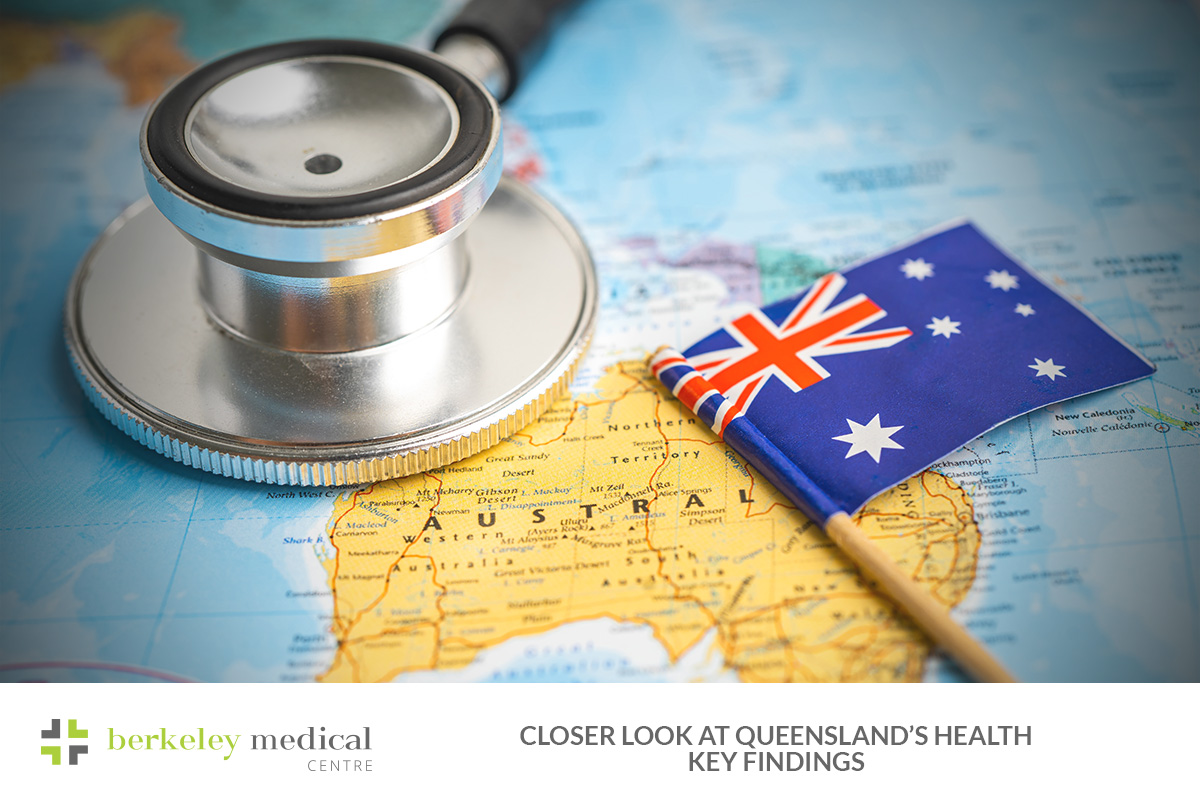Queensland enjoys a reputation for sunshine, beaches and outdoor living. However, the latest Queensland health statistics show that the state’s well being is a mix of progress and challenge. Queenslanders are living longer and smoking less, but obesity, dementia and mental health concerns continue to rise.
At Berkeley Medical Centre in Brisbane, we want our patients to understand these trends so they can make healthier choices. Let’s take a closer look at the key findings shaping health in Queensland today.
Queenslanders Live Longer Than Ever
Life expectancy in Queensland continues to rise. Queenslanders today live longer than those born two decades ago. Improved cancer survival rates, better management of chronic disease and advances in healthcare contribute to this positive outcome.
However, longer lives bring new challenges. Dementia in Queensland has increased rapidly and is now set to overtake heart disease as one of the leading causes of death. This trend highlights the importance of early detection, long-term care planning and community awareness.
Smoking Declines While Vaping Increases
Queenslanders have reduced smoking rates by more than half over the past 20 years. This remarkable drop has saved tens of thousands of lives and lowered the risks of lung cancer, heart disease and stroke.
Meanwhile, vaping is gaining popularity, particularly among young Queenslanders. Although some people view it as a safer alternative, growing evidence links vaping to potential harm. As a result, public health experts remain concerned about its long-term effects.
Obesity Emerges as Queensland’s Biggest Health Risk
Obesity has now overtaken smoking as the leading preventable health risk in Queensland. More than two-thirds of adults in the state are overweight or obese.
This shift creates major health challenges, as excess weight contributes to:
- Type 2 diabetes
- Heart disease
- Stroke
- Certain cancers
As a result, tackling Queensland obesity rates requires both lifestyle changes at the individual level and wider community initiatives to promote healthy eating and active living.
Chronic Disease Patterns Are Changing
Deaths from coronary heart disease in Queensland have dropped by more than 60% in the past two decades. Preventive healthcare, lifestyle changes and medical advances all play a role in this success.
However, deaths from dementia have risen by more than 150% in the same period. This rapid increase reflects Queensland’s ageing population and highlights the urgent need for dementia care services.
Cancer Outcomes Show Both Progress and Risks
Overall cancer survival rates are improving in Queensland. Early detection programs, awareness campaigns and better treatments have made a clear difference.
Nevertheless, colorectal and pancreatic cancers are increasing in younger Queenslanders. This concerning trend matches global patterns and underlines the importance of regular screenings, even at younger ages, as well as maintaining a healthy lifestyle.
Vaccination Rates in Queensland Slip
Vaccinations protect Queenslanders from serious illness and have historically reduced the spread of preventable diseases. Despite this, childhood vaccination rates in Queensland have declined since 2020.
This drop increases the risk of outbreaks of diseases like measles and whooping cough. Staying up to date with recommended vaccines remains one of the easiest and most effective ways to safeguard individual and community health.
Maternal and Child Health Trends
Maternal health shows mixed results. On the positive side, fewer mothers smoke during pregnancy, which leads to healthier babies.
However, diagnoses of gestational diabetes have more than doubled in the past decade. This condition affects both mothers and babies, making early testing, close monitoring and supportive care essential during pregnancy.
Mental Health in Queensland
More Queenslanders report struggling with mental health. Stress, anxiety and depression are increasingly common, particularly among young adults.
These rising concerns show the importance of accessible GP care, counselling and early referral to psychologists. Addressing mental health early prevents long-term impacts on individuals and families.
Regional vs. City Health Outcomes
Health outcomes still vary depending on where Queenslanders live. Residents in Brisbane and other metropolitan areas usually enjoy better access to services and healthier outcomes. In contrast, people living in regional and remote areas face higher rates of chronic disease and limited healthcare options.
Closing this gap remains a key challenge for improving health across Queensland.
Key Queensland Health Findings at a Glance
- Life expectancy is rising steadily.
- Smoking rates have dropped, but vaping is increasing.
- More than two-thirds of adults are overweight or obese.
- Dementia deaths are climbing and will soon overtake heart disease.
- Colorectal and pancreatic cancers are increasing in younger Queenslanders.
- Childhood vaccination rates have declined since 2020.
- Gestational diabetes among mothers has more than doubled in 10 years.
- Mental health challenges continue to grow.
- Regional Queenslanders experience poorer health than city residents.
Conclusion
Queensland’s health in 2025 shows progress and challenge in equal measure. Life expectancy is higher, smoking is down and cancer survival is improving. However, obesity, dementia, declining vaccination rates and mental health pressures remain serious concerns. At Berkeley Medical Centre in Brisbane, we support patients and families in making healthier choices every day. Whether you need chronic disease management, skin cancer checks, vaccinations or mental health support, our GPs are here to help you live a longer and healthier life.
Source: https://www.health.qld.gov.au/newsroom/news/how-healthy-are-queenslanders







